The worship of King Hung is a cultural source that has lasted for thousands of years.
(Baonghean.vn) - Hung King's death anniversary has long been an important holiday for Vietnamese people everywhere, no matter where they go, to remember their homeland.
On this occasion, Nghe An Newspaper interviewed Associate Professor Dr. Nguyen Quang Hong - Lecturer of the History Department, Vinh University about the origin of the Hung Kings' Commemoration Day on the 10th day of the 3rd lunar month every year and the historical vestiges of the Hung Kings' dynasties on Nghe An land.
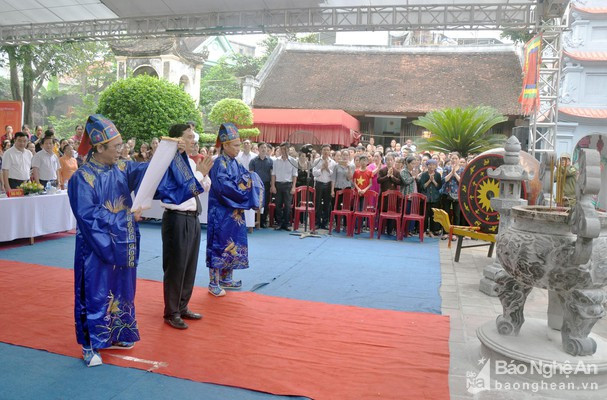 |
| Tourists come to offer sacrifices at Hong Son Temple on the occasion of the 1st Anniversary of the Ancestors. Photo: PV's document |
PV: Dear Associate Professor, Dr. Nguyen Quang Hong, could you please tell us about the formation and development process of the Van Lang state and the historical stories and beautiful features in the Hung King worship belief?
Associate Professor, Dr. Nguyen Quang Hong:Belief in worshiping King Hunghas become a cultural beauty in the material and spiritual cultural life of the Vietnamese people for many centuries. And since ancient times, the sacred land of Phong Chau - Vinh Phu has been considered the ancestral land. The successive generations of the 54 ethnic groups of Vietnam always consider it the land where the descendants of Hong Lac and 18 generations of Hung Kings built and developed the first two civilizations, the Van Lang civilization and the Au Lac civilization.
In which, Van Lang civilization is associated with 18 Hung Kings. Many historical traces, legends, and myths have confirmed that the Hung King period is a real period in the history of the Vietnamese nation. The Au Lac civilization is the period associated with Thuc Phan An Duong Vuong - the king who had great merit in merging Au Viet and Lac Viet to create the Au Lac state.
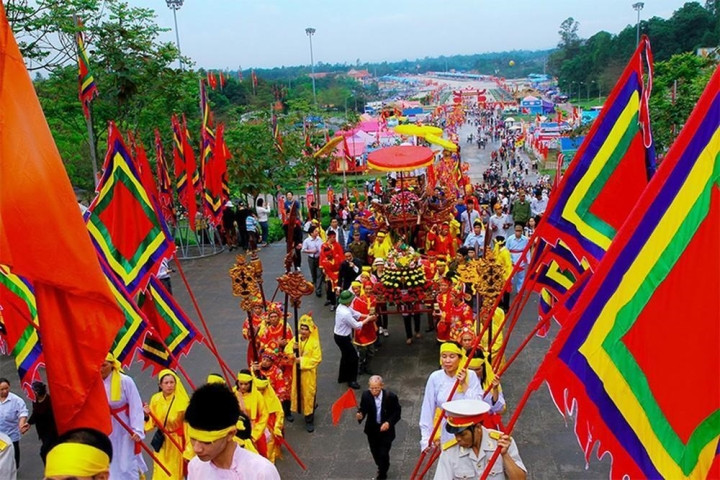 |
| Pilgrimage to Hung Kings' death anniversary. Photo: document |
It must be affirmed that Thuc Phan An Duong Vuong had an even greater merit in mobilizing all the spiritual and material cultural strength of the people to choose the land of Co Loa - Dong Anh, Hanoi and turn that land into the economic, political and cultural center of a country. And in that aspect, the following generations highly appreciated the role of Thuc Phan An Duong Vuong in building Co Loa citadel. The vestiges of Co Loa citadel in many archaeological excavations were confirmed by Korean, Japanese, Chinese and French archaeologists as one of the most unique works in the ancient and medieval period of Southeast Asia.
Thuc Phan An Duong Vuong, along with 15 ethnic communities residing from the Northwest, Northeast, Quang Ninh, Hai Phong, the Northern Delta to Thanh Nghe Tinh, at the same time reclaimed the Red River, Ma River, and Ca River deltas. And in that pioneering and establishing process, he created a culture and civilization that reached the peak of wet rice agriculture in the lower reaches of the rivers.
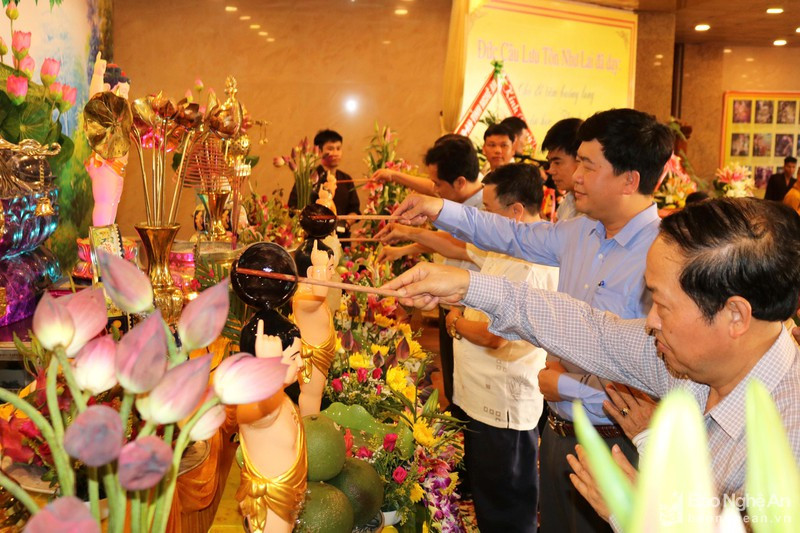 |
| Dai Tue Pagoda in Nam Dan, Nghe An, where Hung Kings are worshiped. Photo: document |
For a long time, people only thought of the 18 Hung Kings, but in fact, in the minds of Vietnamese people, they still worship Thuc Phan An Duong Vuong. It is a pity that, after many times of fighting Trieu Da to protect national independence, Thuc Phan An Duong Vuong could not protect the sovereignty and independence from Trieu Da's invasion war in 179 BC, and the failure of An Duong Vuong and the Au Lac dynasty in the cause of protecting the nation in this year closed the heroic history of 18 Hung Kings building and defending the country. Associated with that is the Dong Son civilization, also known as the Van Lang Au Lac civilization, the first in the Vietnamese lineage.
Because of the great value of civilization, 1,000 years later, generations still preserve and protect the material and spiritual cultural values that the Au Lac dynasty left behind.
PV: The Au Lac civilization and the Hung Kings have eternal value and from that source of strength, our people have overcome countless difficulties in the struggle and protection of the nation. So can you explain this in more detail?
Associate Professor, Dr. Nguyen Quang Hong:People highly appreciate the contributions of the Hung Kings as well as Thuc Phan An Duong Vuong in the cause of building and defending the country for many centuries and that is considered a solid foundation creating a source of strength for generations of Vietnamese people to preserve and protect the material and spiritual cultural values that the Hung Kings and An Duong Vuong periods created. It is those values that have helped us overcome countless difficulties and challenges in the face of the assimilation ambitions of the Northern feudal forces that lasted for more than 1,000 years. Also from that spiritual strength, the Vietnamese people have preserved the culture, village civilization, preserved the tradition of patriotism and solidarity against foreign invaders, and when there was an opportunity, people immediately launched an armed uprising to regain independence.
In the struggle to protect the nation's cultural civilization, especially when there was a favorable opportunity to regain power, in the minds of generations of Vietnamese people, the sense of origin of the Hung Kings became the driving force that urged them to sacrifice themselves to protect the nation.
Therefore, it must be affirmed that the value of the Hung King era left for generations of Vietnamese people during the period of Chinese domination is extremely great.
One more thing, from 905 when the Khuc family gained autonomy until the Nguyen Dynasty signed the Giap Than Treaty on June 6, 1884, after nearly 10 centuries of Vietnamese people building Dai Viet civilization, the foundation that Dai Viet people built was based on the quintessence of the period of Thuc Phan An Duong Vuong and the Hung Kings that had been created before. It must be affirmed that it is the indigenous culture and civilization that generations of Vietnamese people accumulated with their hearts and minds, making it richer to pass on to their descendants. The proof for this is the belief in worshiping Hung Kings that was born, the evidence is that in Phong Chau - Vinh Phu, Hung Kings were worshiped in the past.
PV: So how do we cultivate the vestiges of worship of King Hung and Thuc Phan An Duong Vuong in Nghe Tinh that remain until today?
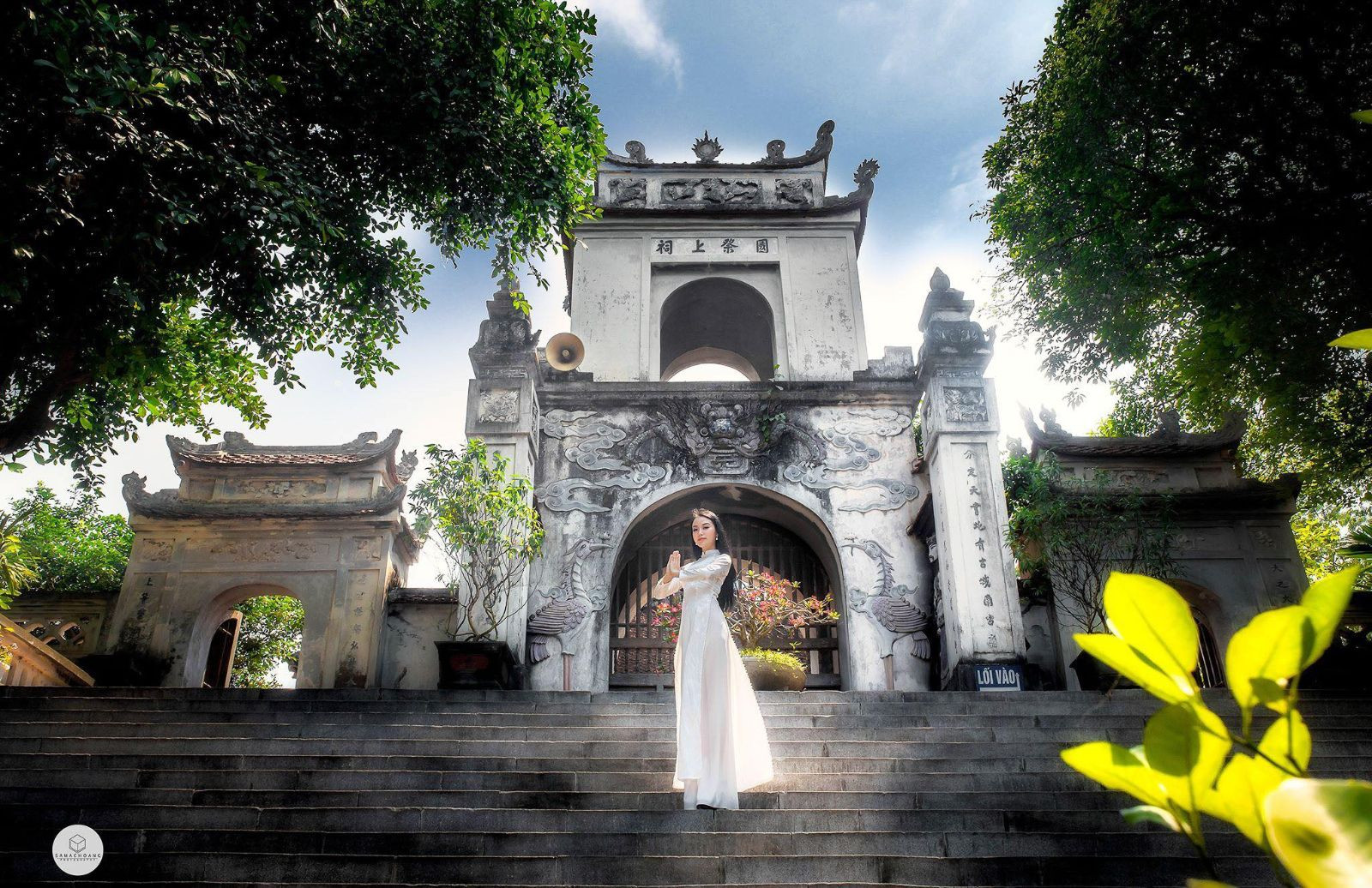 |
| Cuong Temple on Mo Da Mountain, Dien An, Dien Chau, the place associated with the legend of An Duong Vuong's magic crossbow. Photo courtesy |
Associate Professor, Dr. Nguyen Quang Hong:1,000 years ago, in Nghe Tinh, there was a worship of Hung Kings. The traces are still scattered throughout Nghe Tinh. Especially in Long Ngam mountain, Thach Ha - Ha Tinh, there is a pagoda associated with the legend, the legend of Zen master Phat Quang who preached to Chu Dong Tu Tien Dung. Secondly, on Ngan Hong mountain, Ha Tinh, there is a temple worshipping mother Au Co and Lac Long Quan associated with the Hung Kings' life, and here it is recorded in official history, not just legend. Thus, more than 1,000 years ago, there were traces of worshipping Hung Kings here.
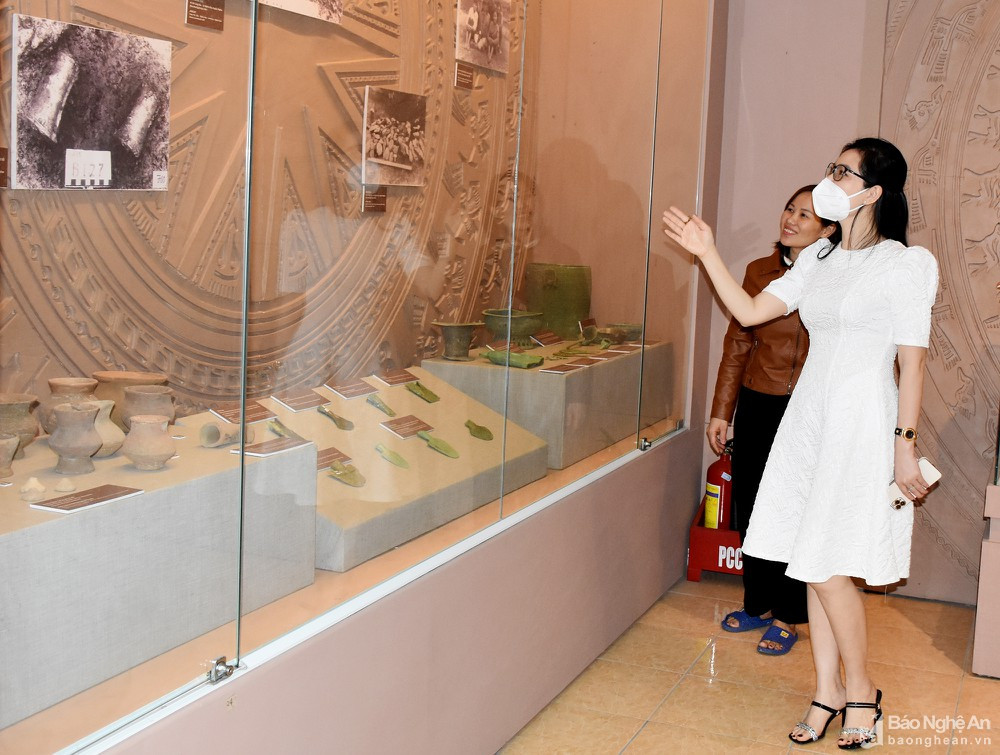 |
| The exhibition of artifacts of the Dong Son culture at Nghe An Museum is an extremely valuable source of historical documents, helping us to study the history of formation and development of the land and people of Nghe An, and is a source of pride for the Lac Hong lineage. Photo: Cong Kien |
For many centuries, besides Dong Anh and Hanoi, only Nghe An has built a temple to worship An Duong Vuong and the governors of Nghe An from the Khuc, Duong, Ngo, Dinh, Le, Ly, Tran, Nguyen dynasties... History books record that the Nguyen Dynasty emperors after going to Thang Long all stopped by Nghe An to offer incense at An Duong Vuong temple in Dien An, Dien Chau. During the reign of King Tu Duc and later kings, this temple was restored. Later, in the renovation process, the Party and authorities at all levels made many efforts to restore the temple under Mo Da mountain in Dien An - Dien Chau.
It is important to affirm that from the 19th century until now, the residents of Vinh Yen and Yen Truong (now Ben Thuy Ward, Vinh City) have worshiped the Hung Kings. That trace is at Hong Son Temple. For hundreds of years, every week before the death anniversary, people going to Vinh market buy fruits and flowers to offer to the Hung Kings' altar. The most joyful thing is that the Hung Kings' worship place on Dai Tue Mountain is not only Buddhists but also people from inside and outside the locality come to pay their respects to the Hung Kings.
PV: There is a folk song that has been passed down from ancient times: "No matter where you go/ Remember the death anniversary of the ancestors on the 10th of March/ No matter where you trade/ Remember the death anniversary of the ancestors on the 10th of March". So, Associate Professor, Doctor, turning to the origin, turning to the homeland is the sacred beauty of the children of Vietnam, and the death anniversary of the ancestors is not only a day for us to admire the heroic spirits of the Hung Kings era but also an occasion for us to turn to the origin, to better understand the dignity and cultural beauty of each child of Vietnam. Could you share about this?
Associate Professor, Dr. Nguyen Quang Hong:I want to affirm that, since the period of Chinese domination, the Han people have tried to erase the sacred cultural values of the Vietnamese people with the aim of cultural assimilation, but failed. Because, Vietnamese culture is like a flowing source that cannot be stopped and one of those sacred cultural beauties is the worship of Hung Kings, heroes, and ancestors. Currently, the worship of Hung Kings is spreading widely in the Southern Delta and the Mekong Delta, so the worship of Hung Kings is universal, a cultural source that has been flowing for thousands of years. And especially in Nghe An and Ha Tinh, this source not only has the meaning of "returning", but it is also a religious need that flows in the blood and flesh of every Nghe An citizen.
One very happy thing is that schools now have built social resources for the young generations to return to Hoan Chau land on each occasion of Hung King's death anniversary. This is not only to educate the awareness of learning about the origin but also to educate the children about gratitude. And this eternal cultural source is the unmistakable beauty of every Vietnamese child now and forever.
PV: Thank you, Associate Professor, for this conversation!
